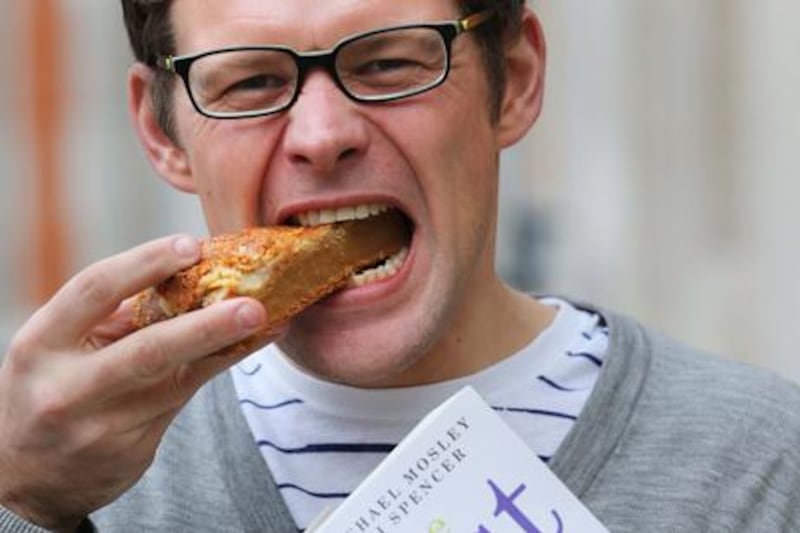It's 3pm and I am, officially, starving. Breakfast seems like it was hours ago and dinner feels like a distant mirage, tantalisingly out of reach. I look with intense longing at the fresh carrot cake made, rather cruelly, by my wife just yesterday, its full-fat, cream cheese topping glistening in the afternoon light. But, I am on a diet. It doesn't matter too much, though. I can have a huge slice tomorrow.
And if that seems like a ridiculous weight-loss plan, think again. It's fully within the rules of The Fast Diet, the book by Dr Michael Mosley and the former columnist for The National Mimi Spencer that is currently topping Amazon's book charts and taking the UK by storm.
The deal is simple. For two non-consecutive days a week, you must fast - although not completely. For men, a maximum of 600 calories is permissible on those days, and a measly 500 for women. On the other days, you can eat and drink exactly what you want. Sounds too good to be true? Even Spencer was unsure about it to start with - and her name is on the front of the book.
"I'm always sceptical about diets, having - like lots of women - tried and failed at so many over the years," she says.
"But after first encountering intermittent fasting when I watched a BBC TV documentary presented by Dr Michael Mosley, the evidence seemed really strong and firmly based in science.
"And even though the first 'fast days' can be tough, hunger is occasional and manageable, as anyone who has fasted for religious purposes will know. I've lost 20 pounds in six months, I am leaner, fitter, healthier and, I have to admit, happier."
Spencer got involved with The Fast Diet after writing about intermittent fasting. The collaboration with Mosley began when they realised that he could explain the science behind it and she could make it accessible to "normal" people. In the book, there are also hints, tips and menu plans.
And that's what makes The Fast Diet so alluring. I don't "do" diets, but somehow, this seems less like a monotonous calorie-counting trudge through the week and more like an achievable challenge. Like the Prophet Mohammed, I choose to fast on Mondays and Thursdays and underline the page that reassures me that if I feel hungry, I'm probably just thirsty, for which a glass of water will suffice. Hopefully.
"The trick is to keep busy on the fast days," says Spencer. "Drink black tea or coffee. Have a Fast Friend who's on the same regime and 'gets it' and can offer support if you're feeling hungry. And remember that tomorrow is another day, a day when you can eat freely. And if you're really desperate, a little snack is OK - carrots and hummus, a handful of almonds."
Actually, this is where I disagree with Spencer; as many dieters know, the key to success is will power and it's the psychological element to The Fast Diet that is immediately compelling. A few nuts later, and who knows what might happen. But abstaining on my fast day makes the next day easier, too. Instead of wanting to gorge myself silly on this "normal" day, the thought of breaking up the morning with a full-fat latte and a muffin seems indulgent. Gluttonous, even. The Fast Diet changes perceptions of hunger very quickly.
"Absolutely," Spencer agrees. "There is clear anecdotal evidence that your appetite changes once you've weaned yourself off constant grazing and high-calorie, quick-release carb foods. You stop craving foods that you once relied upon and you start wanting to eat more healthily, even on non-fast days. It's a positive feedback loop."
And the proof, to use a completely inappropriate phrase, is in the pudding. In just two weeks, I've lost five pounds. In that time, I've gone out to dinner at restaurants or at friend's homes four times, without ever having to burden anyone with the depressing line: "Sorry, I'm on a diet." And if it seems incredibly straightforward - a calorie limit on two days - that's because it really is. As Spencer says, there's no sleight of hand, "just the simple rules that can be written in a couple of sentences".
No wonder the book has become so popular so quickly. It does have its critics - for all the science surrounding an intermittent fasting diet, this particular 600-calorie version doesn't have enough long-term research surrounding it to be irrefutable.
One American study of a similar diet undertaken by overweight women found they lost weight but were also more likely to feel tired and have headaches, while pregnant women and people with diabetes should steer clear.
Still, history - and religion - tells us Spencer and Mosley are certainly on the right track.
"Anyone who has fasted for Ramadan might already know the benefits it can bring - clear-headedness, a sense of control and uplift, " she says. "Many great philosophers, thinkers, academics and doctors were devotees. It has great historical roots, which is one reason why we are so confident about it. And it isn't just about weight loss. It can have a wide spectrum of health benefits, too."
Spencer has been so enthused by the success of the book, she's now working on the official Fast Diet recipe book. Somewhat incredibly, by the time it's published, I'm willing to believe I'll still be fasting two days a week.
Now, back to that carrot cake.
The Fast Diet (Short Books) is out now. Visit www.thefastdiet.co.uk
Follow us
[ @LifeNationalUAE ]






